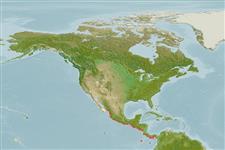Environment: milieu / climate zone / depth range / distribution range
Écologie
marin; saumâtre. Tropical; 25°N - 4°N
Eastern Pacific: Gulf of California to northern Colombia.
Taille / Poids / Âge
Maturity: Lm ? range ? - ? cm
Max length : 37.4 cm SL mâle / non sexé; (Ref. 95327); common length : 25.0 cm TL mâle / non sexé; (Ref. 55763); poids max. publié: 626.00 g (Ref. 124487)
Body elongate and somewhat compressed; dorsal profile slightly concave above the eyes; lateral line extending to posterior edge of caudal fin; second anal spine, when folded down, reaching or surpassing origin of caudal fin; pectoral and pelvic fins sub-equal; first gill arch with 26 to 31 gill rakers; back blue gray; belly white; lateral line pale; membranes between dorsal spines and between second and third anal spines pale (Ref. 55763).
Adults are found mainly in estuaries but also enter freshwater to an elevation of 50 m. Diet consists primarily of fish, crustaceans and mollusks (Ref. 36880).
Life cycle and mating behavior
Maturité | Reproduction | Frai | Œufs | Fécondité | Larves
Bussing, W.A., 1995. Centropomidae. Róbalos. p. 987-995. In W. Fischer, F. Krupp, W. Schneider, C. Sommer, K.E. Carpenter and V. Niem (eds.) Guia FAO para Identification de Especies para lo Fines de la Pesca. Pacifico Centro-Oriental. 3 Vols. FAO, Rome. (Ref. 9284)
Statut dans la liste rouge de l'IUCN (Ref. 130435)
Menace pour l'homme
Harmless
Utilisations par l'homme
Pêcheries: commercial; pêche sportive: oui
Plus d'informations
Noms communsSynonymesMétabolismePrédateursÉcotoxicologieReproductionMaturitéFraiRassemblement de ponteFéconditéŒufsDéveloppement de l'œuf
RéférencesAquacultureProfil d'aquacultureSouchesGénétiqueElectrophoresesHéritabilitéPathologiesTraitementNutrientsMass conversion
CollaborateursImagesStamps, Coins Misc.SonsCiguateraVitesseType de nageSurface branchialeOtolithesCerveauxVision
Outils
Articles particuliers
Télécharger en XML
Sources Internet
Estimates based on models
Preferred temperature (Ref.
123201): 24 - 28.6, mean 27.5 °C (based on 26 cells).
Phylogenetic diversity index (Ref.
82804): PD
50 = 0.5005 [Uniqueness, from 0.5 = low to 2.0 = high].
Bayesian length-weight: a=0.00759 (0.00508 - 0.01134), b=3.03 (2.91 - 3.15), in cm total length, based on LWR estimates for this species & Genus-body shape (Ref.
93245).
Niveau trophique (Ref.
69278): 3.8 ±0.59 se; based on food items.
Résilience (Ref.
120179): Haut, temps minimum de doublement de population inférieur à 15 mois (Preliminary K or Fecundity.).
Fishing Vulnerability (Ref.
59153): Moderate vulnerability (36 of 100).
Nutrients (Ref.
124155): Calcium = 187 [113, 334] mg/100g; Iron = 1.62 [0.97, 2.52] mg/100g; Protein = 19.6 [17.2, 21.9] %; Omega3 = 0.299 [0.130, 0.710] g/100g; Selenium = 37.4 [18.2, 81.0] μg/100g; VitaminA = 14.5 [5.7, 39.0] μg/100g; Zinc = 1.5 [1.1, 2.1] mg/100g (wet weight);
